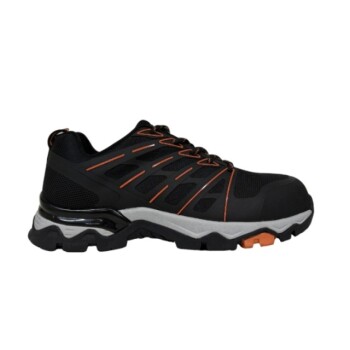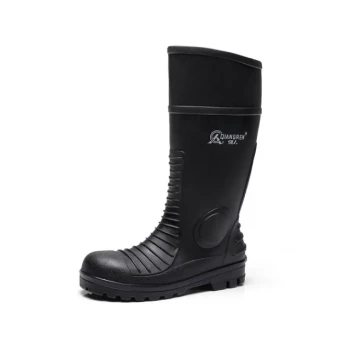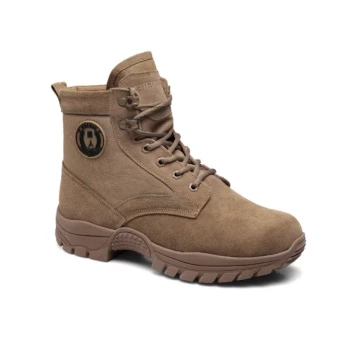For farm work, a true cowboy boot is a tool, not a fashion statement. The most critical factors to consider are a durable, full-grain leather construction for protection, a high-traction, non-skid rubber sole for safety on unpredictable terrain, a tall shaft to guard your lower legs, and a correct fit that prioritizes all-day comfort and function over aesthetics.
The core principle is simple: a work boot's value is measured in safety and durability, not style. You must select features designed for the harsh realities of farm labor, where a slip-resistant sole and protective materials are non-negotiable safety equipment.
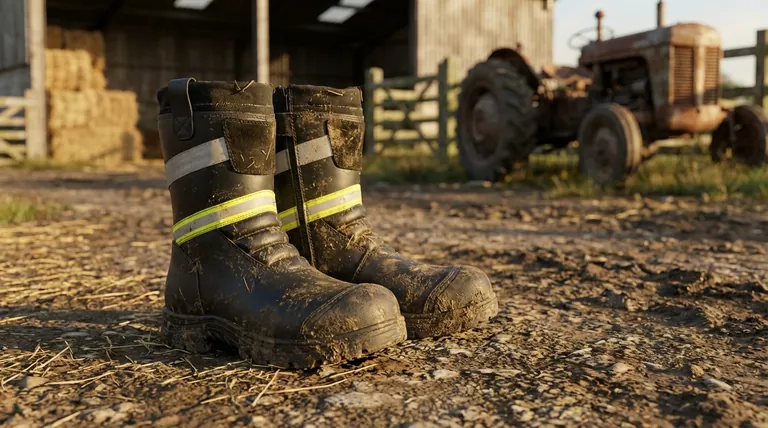
Deconstructing the Ideal Farm Work Boot
Choosing the right boot means understanding how each component contributes to your safety and comfort during long, demanding days. We will break down the essential anatomy of a functional work boot.
The Foundation: Sole and Heel
The sole is the single most important safety feature. A traditional leather sole, while classic, is dangerously slick in wet or muddy conditions and is entirely unsuitable for farm work.
Look for a durable rubber or composite sole with a deep, aggressive tread pattern. This provides the necessary grip on uneven ground, mud, and wet concrete, significantly reducing the risk of slips and falls.
The heel should also be functional. A low, wide "block" heel offers far more stability than a taller, angled "riding" heel. Stability is key when you're on your feet all day, walking on unpredictable surfaces.
The Primary Material: Leather Durability
Full-grain leather is the standard for a reason. It is the most durable and resilient type of leather, capable of withstanding the scrapes, moisture, and chemical exposures common on a farm.
This thick material acts as a first line of defense against minor impacts and abrasions, offering a crucial layer of protection that synthetic materials often cannot match.
The Protective Shield: Shaft Height
The tall shaft of a cowboy boot is a key functional advantage. A shaft that is 12 inches or higher protects your lower legs from brush, thorns, snake bites, and splashes from mud or chemicals.
It also provides a degree of ankle support and prevents dirt, hay, and other debris from getting inside your boot, which is a major factor for all-day comfort.
The Core of Comfort: Fit and Toe Shape
An improper fit can lead to debilitating pain and blisters. A work boot should fit snugly around the heel and arch to prevent your foot from sliding, but there must be ample room in the toe box.
For farm work, a square or rounded toe is almost always superior to a pointed toe. These shapes provide more space for your toes to spread naturally, which is critical for comfort and balance during long hours of standing and walking.
Beyond the Basics: Essential Features
While the core construction is vital, several modern features elevate a good boot into a truly indispensable piece of equipment.
All-Day Wearability: Insoles and Support
Factory insoles are often insufficient for a 12-hour workday. Look for boots with removable, cushioned insoles and good arch support. Many top work boot brands, like Ariat, build advanced comfort technology directly into their platforms.
A moisture-wicking lining is also highly beneficial. It helps pull sweat away from your feet, keeping them drier and reducing the chance of blisters and discomfort in both hot and cold weather.
Specialized Protection: Safety Toes
If you work with heavy machinery, large animals, or heavy objects, a safety toe is mandatory. These are typically made of steel, composite, or alloy materials.
Always ensure the safety toe is ASTM-rated to meet official safety standards. A composite toe is often lighter than steel and doesn't conduct cold, making it a good choice for winter conditions.
Understanding the Trade-offs
No boot is perfect for every single task. Being aware of the inherent compromises is key to making an informed decision.
Durability vs. Breathability
The thick, durable leather required for farm work is not highly breathable. In hot weather, your feet will get warm. While a moisture-wicking liner helps, a true work boot will never feel like a sneaker.
Break-In Period
High-quality leather boots require a break-in period. They may feel stiff and uncomfortable for the first few days or weeks of wear. This is a necessary trade-off for a boot that will eventually mold to your foot and last for years.
Cost as an Investment
A well-made, durable work boot is not cheap. However, viewing the price as an investment in your safety and long-term comfort is crucial. A cheaper boot made with inferior materials will fail faster and offer less protection, costing you more in the long run.
Making the Right Choice for Your Goal
Select your boot by prioritizing the features that solve the biggest challenges of your specific work environment.
- If your primary focus is working with heavy livestock or machinery: Your first priority must be an ASTM-rated safety toe and a robust, non-slip sole.
- If your primary focus is navigating wet, muddy fields: Ensure the boot has a guaranteed waterproof construction, not just water-resistant leather.
- If your primary focus is all-day comfort for general labor: Focus on a superior cushioning system, good arch support, and a properly fitting, roomy toe box.
Ultimately, the right boot becomes a trusted tool that enhances your safety and productivity on the farm.
Summary Table:
| Key Factor | Why It Matters for Farm Work |
|---|---|
| Sole & Heel | Non-slip rubber sole with deep tread and a wide block heel for stability on uneven terrain. |
| Material | Full-grain leather offers superior durability and protection against abrasions and moisture. |
| Shaft Height | 12+ inches to protect lower legs from brush, thorns, and debris. |
| Fit & Toe Shape | Snug heel/arch with a roomy square or rounded toe box for all-day comfort. |
| Special Features | Consider ASTM-rated safety toes for heavy work and moisture-wicking linings for comfort. |
Ready to Equip Your Team with Durable, Safe Work Boots?
As a large-scale manufacturer, 3515 produces a comprehensive range of durable footwear built for demanding environments. We understand that for distributors, brand owners, and bulk clients, a work boot is a critical tool for safety and productivity.
We can help you provide:
- Superior Durability: Boots crafted with high-quality, full-grain leathers.
- Enhanced Safety: Options featuring non-skid soles and ASTM-rated safety toes.
- Bulk Efficiency: Reliable supply and consistent quality for your volume needs.
Let's discuss your specific requirements. Contact our team today to learn how our production capabilities can deliver the right boots for your customers.
Visual Guide
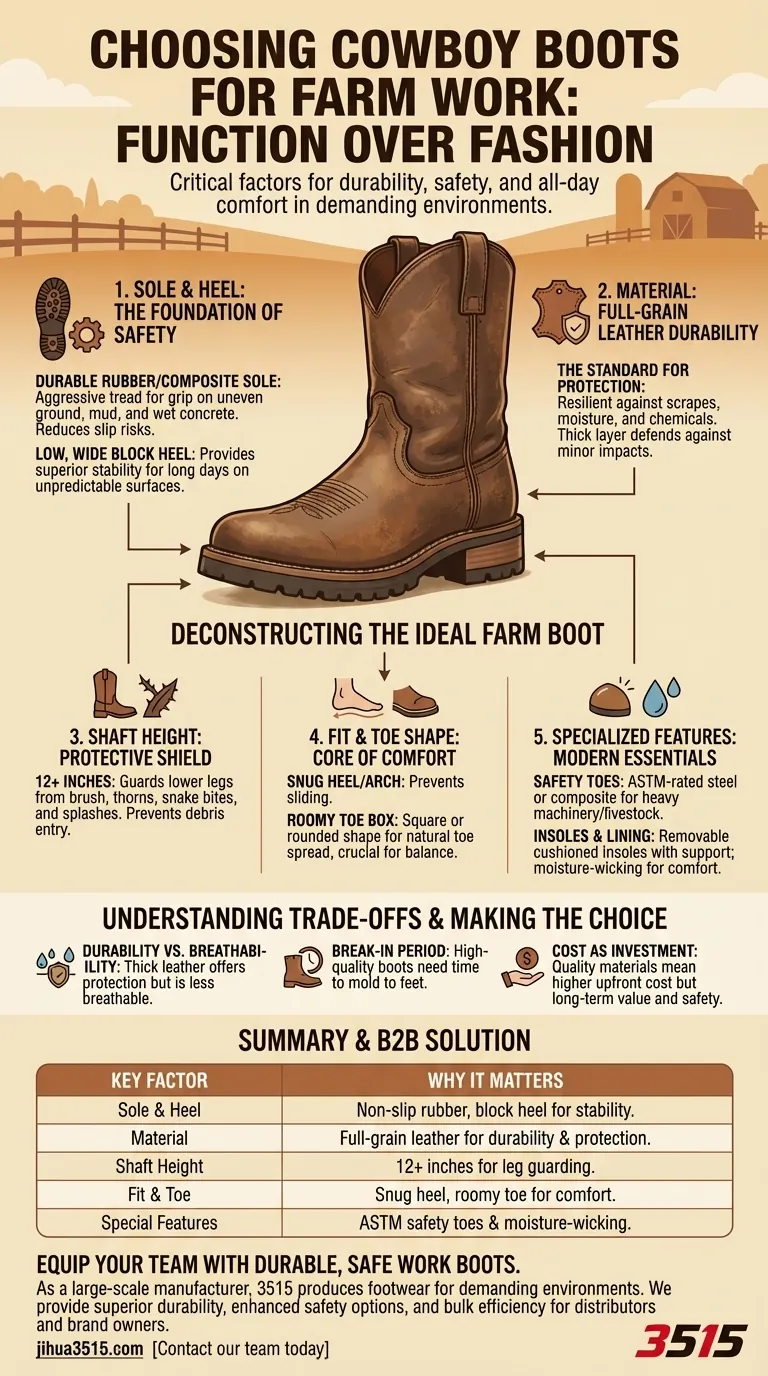
Related Products
- High Performance Fire-Retardant Waterproof Safety Boots
- Premium KPU Injection Athletic Style Safety Shoes
- Premium Grain Leather Safety Boots for Bulk Supply
- Premium High-Cut Waterproof Safety Boots Manufacturing & Wholesale Solutions
- Customizable Anti-Smash Safety Boots for Wholesale & Private Label Manufacturing
People Also Ask
- How do work boots provide impact and compression resistance? The Science Behind the Protective Toe Cap
- Why is safety the top priority when selecting oilfield work boots? Essential Protection for High-Risk Environments
- What physical protections are provided by the S1 standard and integrated steel toecaps in industrial safety boots? Ensure Ultimate Foot Safety & Hazard Protection
- What are the core advantages of using impact-resistant safety shoes in dairy farm mechanical work zones?
- Why do operations involving heavy fruit bunches and 'gancu' require anti-smash and anti-puncture safety boots?

